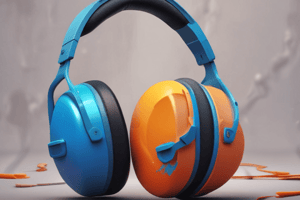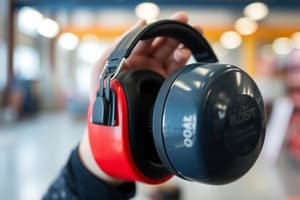Podcast
Questions and Answers
What is the minimum noise level that requires mandatory use of hearing protection?
What is the minimum noise level that requires mandatory use of hearing protection?
- 95 dB
- 90 dB (correct)
- 85 dB
- 80 dB
What is the purpose of the noise reduction ratio (NRR)?
What is the purpose of the noise reduction ratio (NRR)?
- To determine the frequency of noise exposure
- To calculate the effectiveness of hearing protection devices (correct)
- To measure the decibel level of noise
- To diagnose hearing loss
What is the correct way to insert earplugs?
What is the correct way to insert earplugs?
- Rolling and compressing the foam into a cylinder before inserting it into the ear canal (correct)
- Inserting the earplug into the ear canal while it's not compressed
- Inserting the earplug into the ear canal with the ear canal open
- Using cotton as an earplug
What should be done to ensure earmuffs are properly sealed?
What should be done to ensure earmuffs are properly sealed?
What is the frequency of hearing tests for employees?
What is the frequency of hearing tests for employees?
Flashcards are hidden until you start studying
Study Notes
Hearing Protection Use
- Voluntary use of hearing protection is recommended when exposed to an 8-hour Time Weighted Average (TWA) of 85-90 decibels (dB).
- Mandatory use of hearing protection is required when:
- Exposed to an 8-hour TWA of 90 dB.
- Exposed to an 8-hour TWA of 85 dB and have suffered a Standard Threshold Shift (STS) or have not had a baseline hearing test.
Hearing Protection Devices
- Hearing protection devices must reduce employee noise exposure below an 8-hour TWA of 90 dB.
- For employees with STS, noise exposure must be reduced below an 8-hour TWA of 85 dB.
- Noise reduction ratio (NRR) is a key factor in selecting effective hearing protection devices.
Earplugs and Canal Caps
- Earplugs and canal caps must be properly inserted to seal the ear canal.
- To insert, slowly roll and compress foam into a cylinder, then insert into the ear canal while compressed.
- Earplugs keep noise from reaching the eardrum.
- Cotton is not a suitable earplug.
Earmuffs
- Earmuffs must seal against the head with ears fully enclosed.
- Ensure hair is out from under the muffs, and glasses and caps do not interfere with the seal.
- Adjust the headband to exert even pressure.
- Clean earmuffs with warm, soapy water and rinse.
Key Reminders
- Hearing is a vital sense that can be easily damaged.
- Noise exposure of 85 dB or more can cause hearing loss.
- Hearing loss is permanent and cannot be cured or repaired.
- Annual hearing tests can detect hearing loss.
- Hearing protection devices must be worn in high-noise areas to prevent hearing loss.
Studying That Suits You
Use AI to generate personalized quizzes and flashcards to suit your learning preferences.




